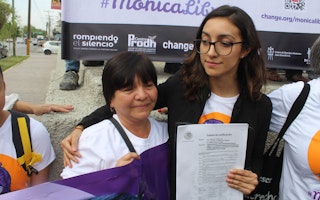Can New Orleans Reinvent Its Criminal Justice System?
By Jon Wool
The Vera Institute of Justice, with support from the Open Society Foundations and other funders, is working with New Orleans city government and community leaders to help reinvent—rather than rebuild—the city’s criminal justice system. We asked Jon Wool, director of Vera’s New Orleans office, about his work.
Long before Hurricane Katrina, New Orleans’s criminal justice system was broken. Rates of violent crime as well as the use of arrest and detention were many times higher than in other U.S. cities. Most arrests, however, were for minor offenses, and once in jail people would languish for over a month waiting for a formal charge. The situation was only made worse by a public defenders office overwhelmed by unworkable caseloads.
Although the devastation wrought by Katrina exposed these failings, it also had a more positive outcome—encouraging political newcomers interested in reforming New Orleans to run for office. James Carter and Shelley Midura were two such reform-minded City Council members, who in 2006, asked Vera for assistance.
Meetings were held with local judges, the superintendent of police, district attorney, public defender, and other key criminal justice leaders to discuss how to go about reinventing the system, and Vera subsequently wrote a report for the council that identified four areas ripe for reform, most of which would result in fairer, more effective practices and less reliance on detention.
In the Spring of 2007, the city council adopted the report’s recommendations and Vera, along with the council and Baptist Community Ministries, began working to put them into practice. The Criminal Justice Leadership Alliance, made up of government partners and supported by non-profits, was born. Working groups—still active today—began driving the plan’s implementation.
The groups help develop reforms, pinpoint key issues, and debate competing interests. So far the alliance has achieved a number of goals, including:
- decreasing the time from arrest to charging and arraignment by a factor of six; expanding the use of summonses instead of custodial arrest for minor misdemeanors;
- shifting prosecution of marijuana and other misdemeanor cases from state court to the municipal court, resulting in a dramatic improvement in case outcomes and court efficiency; and
- developing a system that allows for continuity of defense representation and more efficient prosecutorial assignment.
The two main priorities now are improving the municipal court system and developing New Orleans’s first pretrial services system.
Although developing pretrial services harks back to Vera’s first initiative in 1961 in Manhattan, our New Orleans work has some distinct differences from the organization’s other efforts. New Orleans is the home of our only local office. And the high-intensity local engagement Vera is undertaking here might prove a useful model for other jurisdictions.
In New Orleans there was no other way to match the need. Early on we recognized the necessity for a concentrated, long-term, on-the-ground presence, both to fully appreciate the political and cultural climate and also to deliver the sort of comprehensive services necessary to see reforms through. Our staff live and work in the community, are engaged with community groups and civic leaders, and experience the struggles and the pride that all New Orleanians feel.
The fifth anniversary of Katrina brings into focus the fundamental question of whether New Orleans is going to reinvent its criminal justice system. We see many hopeful signs. There’s much more discussion about the need for systemic thinking and collaboration across agency lines and system actors are working together to solve problems rather than simply shift blame as convenient. There’s more recognition that how we practice criminal justice has enormous and far-reaching implications for how the city sees itself and treats its residents. And community members’ insistence that system decisions be made in their interest rather than in the interest of system actors is increasingly being heard.
Yet we have a long way to go. The criminal justice system remains hampered by funding structures that produce perverse incentives or pose obstacles to reform. For example, the court systems are funded significantly through fines and fees that flow from convictions, providing an incentive to process as many cases as possible. The jail is still funded through a per diem structure, incentivizing the detention of as many people as possible, in an endless and unreachable effort to adequately fund its operations. And the city still leads the nation in its rate of local jail detention, and the number of arrests per capita is also much higher than in other jurisdictions.
As we mark the fifth anniversary, the city is set to make a final decision about rebuilding the jail, a task necessitated by Katrina damage. The question is starkly posed: Are we going to build an enormous new jail that continues a longstanding reliance on unmatched rates of detention or are we going to redirect resources that can be used to begin to solve some of the city’s crushing problems?
What is heartening is that some civic and government leaders and many grassroots groups, including among the Open Society Foundations-funded New Orleans Coalition on Open Governance, are coming together in an effort to make a rational decision about the jail.
But the jury’s still out: will we rebuild the old system or reinvent one that is fairer and more effective?
* * *
In the five years since Hurricane Katrina hit New Orleans and the levees broke, residents have developed innovative approaches to tackling some of the city’s—and the nation’s—most persistent problems: criminal justice reform, unresponsive government, and racial and economic inequality. In recognition of these efforts, during the month of August the Open Society Blog shines a light on people and organizations in New Orleans bringing change from within one of the country’s most important cities.
Jon Wool is director of the Vera Institute of Justice’s New Orleans office.


